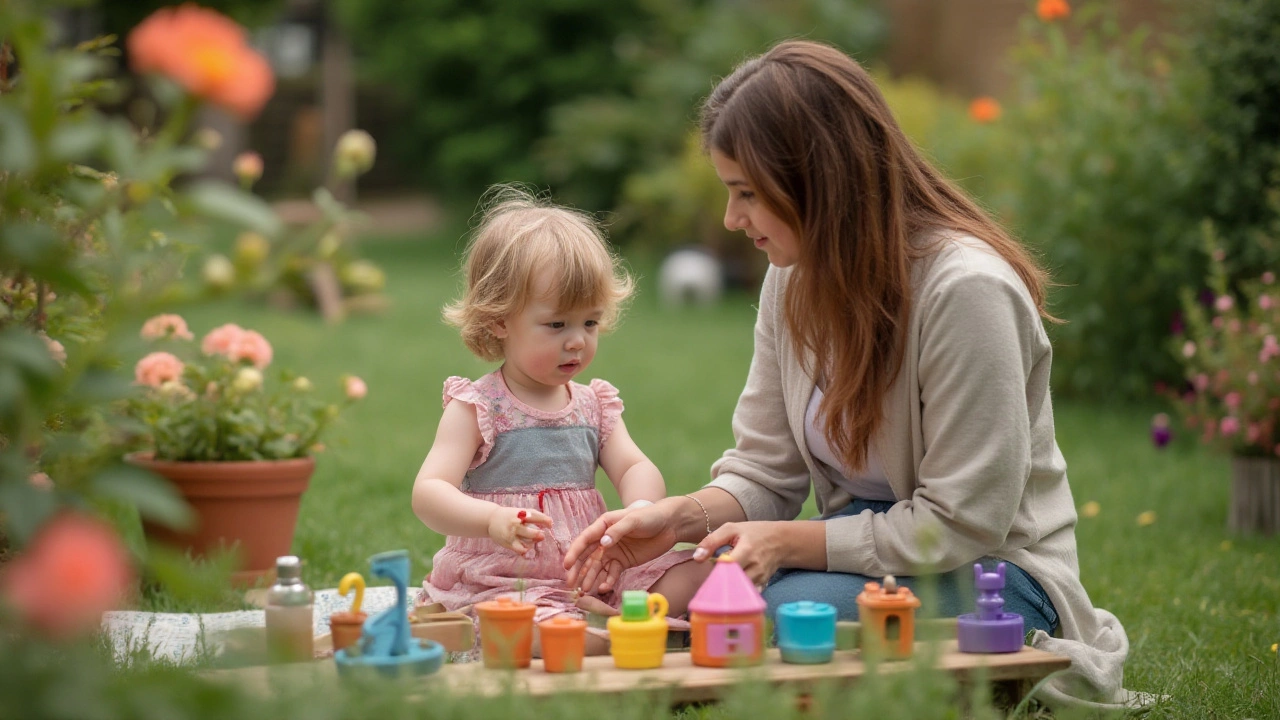Embarking on the journey of raising a child with special needs is an experience filled with unique challenges, profound growth, and unparalleled love. Families navigating this path often encounter a complex range of emotions, responsibilities, and societal interactions that reshape daily life.
This article delves into the multi-faceted ways a special needs child affects family dynamics. From the emotional ebbs and flows to the practical adjustments required, we explore how families adapt, thrive, and find joy amidst the challenges. Insights into financial considerations, sibling roles, and educational strategies are shared to provide a comprehensive understanding of both the pressures and inspirations faced by these families.
- The Emotional Landscape
- Financial Implications
- Social Changes and Support
- Educational Adjustments
- The Role of Siblings
- Empowerment and Resilience
The Emotional Landscape
Delving into the heart of any family raising a special needs child reveals a tapestry of emotions as intricate as it is evolving. Initially, families may experience a whirlwind of feelings ranging from shock and uncertainty to denial and profound love. This spectrum of emotions, while challenging, is an integral part of navigating the complexities associated with special needs. For many, the moment of diagnosis is the onset of an emotional journey; it is often marked by confusion as parents wrestle with questions about what the future holds for their child and the family as a whole. Such emotional tides can vary significantly from one family to another and can change over time as understanding and acceptance grow.
Beyond these initial reactions, resilience begins to build within the family unit. Parents and siblings often report feelings of growth and deeper empathy as they learn to adapt to the new normal. This adaptation involves developing an unwavering commitment to the child’s well-being, which can sometimes be emotionally taxing yet profoundly rewarding. Studies indicate that families with strong emotional bonds often report higher levels of happiness and fulfillment despite the challenges that may accompany their circumstances. As emotions stabilize, many parents become proactive advocates for their children, engaging with support groups and advocating for policy changes that can improve their child’s quality of life. A central theme in this journey is transformation, not just of the familial roles and expectations but of personal values and perspectives.
As families progress along this path, community support plays a pivotal role. Leveraging support networks, whether they consist of other parents, support groups, or compassionate professionals, can keep families emotionally buoyant. Social support is linked to reduced stress levels, enabling parents and siblings to manage challenges more effectively. Research has shown that parents with access to robust support networks report improved emotional health compared to those without such resources. In the words of Maya Angelou, "We may encounter many defeats, but we must not be defeated." This ethos resonates deeply within families who find strength and solace in their shared experiences, often developing unique bonds that others may not fully understand but greatly admire.
It is crucial, too, to acknowledge the complex emotional roles siblings of special needs children may inhabit. They often oscillate between protective, nurturing roles and feelings of neglect, as parental attention may naturally be diverted towards the special needs child. Employing family counseling or sibling support groups can be beneficial in fostering understanding and balance within the family. It is not uncommon for siblings to emerge as advocates, inspired by their family dynamics to contribute meaningfully to societal conversations about inclusion and accessibility. As such, while challenging at times, the emotional landscape within these families is also fertile ground for profound personal growth and collective resilience.
Financial Implications
The financial landscape for families with a special needs child can often be a complex terrain to navigate. From the outset, the costs associated with specialized care, therapies, and medical treatments can accumulate rapidly, creating financial strain. Health insurance might not fully cover the wide range of services needed, leaving families to bear much of the financial burden themselves. Many parents find themselves having to make difficult decisions about work—some may reduce hours or leave jobs entirely to provide the dedicated care their child requires, impacting household income significantly.
A notable consideration is securing the resources and specialized services essential for the child's development and quality of life. These might include physical therapy, occupational therapy, and specialized educational programs, each of which comes with its price tag. While state and federal programs offer some assistance, such as Medicaid and certain educational grants, the eligibility criteria can be rigorous, and not all families qualify. Therefore, many families must budget carefully and often seek out additional income sources or financial aid.
To provide more structure to these challenges, it's insightful to look at recent statistics. A study by Autism Speaks noted that the average increased lifetime cost of medical care and therapy for an individual with autism could be as high as $1.4 million. Such figures highlight the significant economic impact these conditions may have on families, emphasizing the need for smart financial planning and advocacy for support services. Moreover, creating a financial safety net becomes paramount as parents consider the long-term care needs of their children.
Special needs education often requires additional resources that are not always readily available in public schools, prompting some families to explore private schooling options, which can lead to further financial considerations. Scholarships and special education savings plans can provide relief, yet they require a proactive approach. Parents frequently engage in extensive research to find the options that best fit their family’s needs. These decisions often involve balancing the child's educational requirements with family finances.
According to a family shared in the journal Pediatrics, "It's not just the additional costs—it's the time spent advocating for and navigating through the maze of coverage and assistance options that add to the stress." This sentiment echoes across many households and signifies the broad systemic challenges involved.
Families also face financial decisions related to future planning, ensuring that provisions are made for a child’s care and independence in adulthood. Special needs trusts are tools often recommended by financial advisors to provide a secure financial foundation without jeopardizing eligibility for government assistance. These aspects demand knowledge and time to manage effectively, as they involve intricate legal and financial decisions.
As families navigate these financial implications, building a supportive community, accessing local resources, and tapping into networks of other families dealing with similar challenges can provide both emotional and practical guidance. Sharing tips, recommendations, and experiences fosters a collective strength that eases the financial burden, enabling families to continue prioritizing their child's well-being.

Social Changes and Support
Navigating the world with a special needs child often brings about significant social changes for families. These changes can include shifts in social circles, recreational activities, and family interactions with the community. One considerable adjustment is the balance between maintaining relationships and meeting the unique needs of their child. Traditional social activities may require adaptations or even substitutions to accommodate specific needs, leading families to seek new networks and communities who share similar experiences. This quest for connection can open doors to unexpected friendships and support networks, but the journey is not without its challenges.
Parents often find themselves advocating within their community to foster understanding and inclusivity. This advocacy can lead to heightened awareness and sometimes initiates broader conversations about accessibility and support gaps. According to a study by the National Institutes of Health, families with a special needs child frequently report a sense of isolation from previous social groups due to a lack of understanding or empathy for their situations. The study emphasizes that seeking out community groups or online forums explicitly for families in similar situations can significantly alleviate feelings of loneliness. Through these groups, parents gain and share invaluable knowledge, from navigating educational bureaucracies to managing day-to-day emotional stresses.
As families adjust, they often witness changes in how they are perceived socially. While some people may approach with compassion and genuine curiosity, others might respond with awkwardness or avoid interaction altogether. During this transformative journey, support from extended family and friends becomes crucial. Inclusion of the entire family in social outings requires thoughtful planning, yet the rewards of shared experiences are abundant. Some families find it helpful to establish regular playdates with other families who have children with similar challenges, facilitating an environment where children learn social skills at their own pace. These intentional communities foster acceptance and provide a safe space for children and parents alike, a direct testimony to the human spirit's resilience.
Local and national organizations often provide various resources that can ease these social transformations. For instance, programs offered by the Special Olympics or autism networks can introduce families to activities specifically designed to encourage participation by children with special needs. These activities not only create opportunities for social interaction but also promote physical health and confidence in children. Besides, many educational workshops and therapeutic sessions offer parents guidance on enhancing social skills and navigating social situations effectively. It is noted that approximately 60% of parents of children involved in adapted sports report improvements in their children's social skills and an uptick in their happiness levels, according to recent research published in a social psychology journal.
An inspiring element of this social landscape is the resilience and adaptability of the parents and their willingness to reshape their social world in pursuit of their child's happiness and wellness. This adaptability often empowers parents, fostering a semi-professional role in welfare strategy within their communities. Sharing experiences and strategies during social gatherings can lead to the establishment of informal yet powerful advocacy channels, creating ripple effects that gradually enhance community inclusivity.
"Empathy thrives through experience and sharing," a parent of a special needs child eloquently captured during a community symposium, highlighting the profound impact of communal engagement. In there lies the beauty of human coalescence, eschewing barriers and enriching personal and collective journeys alike.
Educational Adjustments
When a family welcomes a special needs child, their approach to education unavoidably shifts in order to meet the unique learning requirements of their child. This journey often begins with understanding the specific needs of the child whether they involve cognitive, physical, or behavioral challenges. For many families, this means working closely with educational professionals to create an Individualized Education Program (IEP), which tailors education plans to bolster the child's strengths while accommodating their challenges. The creation and implementation of an IEP becomes a partnership between parents, teachers, and specialists, ensuring the child receives the most suitable educational environment.
Navigating the school system can sometimes feel daunting, as families strive to find educators and institutions equipped to nurture their special needs child's potential. This often involves researching schools known for their support programs, attending meetings, and advocating consistently for the needs of the child. In many cases, parents find themselves needing to become both an advocate and educator, supplementing at-home learning with materials and methods that align with their child’s pace and style of learning. This requires a delicate balance, as every child learns differently, and what works for one may not work for another.
The importance of a strong support network cannot be overstated. Familial collaboration with educational institutions is essential not only in terms of formal education but also in fostering an inclusive environment that recognizes and celebrates differences. Schools that apply inclusive education principles often see
“significant improvements in both academic and social outcomes,” according to a 2022 report by the National Center for Special Education Research.Such environments can enhance self-esteem and social skills, enabling the child to thrive both educationally and socially.
Families must also explore extracurricular activities that support development outside traditional academic frameworks. This can include specialized therapies such as speech or occupational therapy, martial arts for discipline and coordination, or art and music classes that promote expression and creativity. The varied approaches not only enrich their child's learning but also imbue resilience and adaptability among all family members. This holistic view of education encourages continuous growth and community engagement.
The pursuit of suitable educational adjustments is ongoing, evolving as the child grows and their needs change. Access to resources and patience becomes integral to this process. Families often turn to online communities, special education resources, and workshops that provide updates and tips on navigating educational pathways. Many find solace in the shared experiences of others, realizing that while every child’s journey is distinct, they are not alone in facing these challenges. It is this shared support that often leads to huge strides both in educational attainment and family cohesiveness.

The Role of Siblings
In families with a special needs child, siblings often play a unique role that intertwines support, companionship, and advocacy. These siblings might find themselves on a distinct path that both enriches and challenges their childhood. The presence of a sibling with special needs can influence their growth in profound ways. Often, they cultivate a remarkable sense of empathy, patience, and understanding that sets them apart from their peers. They learn from a young age the importance of diversity and acceptance. The interactions they share and the situations they navigate can foster resilience and a mature sense of responsibility.
The complexities of emotions experienced by siblings can be vast. On one hand, there is the joy and pride in watching their brother or sister achieve milestones that, to others, might seem ordinary. On the other hand, there can sometimes be feelings of jealousy or neglect when attention shifts out of necessity to the special needs sibling. This duality in emotions is natural, yet it is crucial for parents to address these feelings openly and supportively to maintain a balanced family dynamic. Regular family discussions can help siblings feel valued and understood, providing a safe space for them to express their thoughts and fears without judgment.
Research has shown that siblings of children with special needs often excel in empathy and social competence when compared to their peers. According to a study published in the Journal of Family Psychology in 2020, these siblings showed notably higher levels of compassion and a greater tendency to display helping behaviors in unrelated social situations. This increased social sensitivity can be an asset, equipping them with skills beneficial in various aspects of their lives, including friendships, academic settings, and eventually, professional environments.
"The strength and sensitivity displayed by siblings of children with special needs should not only be recognized but celebrated," states Dr. Karen Levine, a psychologist specializing in family dynamics. "They possess a unique perspective that enriches their personal development and enhances their contributions to society."
To support siblings, families are encouraged to engage in activities that cater specifically to their interests and create moments where they can shine in their own right. This might involve dedicating time each week to focus on their hobbies or achievements, separate from their sibling with special needs. Involvement in sibling support groups can also provide an outlet for sharing experiences and connecting with others who understand their unique situation. These groups can be instrumental in providing a sense of belonging, reducing feelings of isolation, and fostering a community of supportive peers.
Moreover, siblings often become the strongest advocates for their special needs siblings, passionately working towards increased awareness and inclusion in schools and communities. As they grow into adulthood, many choose careers in special education, healthcare, or advocacy, driven by the firsthand experiences they’ve witnessed in their families. Their voices and actions are pivotal in promoting understanding and acceptance, and their journey as siblings of a child with special needs often shapes their future in meaningful ways.
Empowerment and Resilience
Navigating life with a special needs child is indeed a journey of continual learning and adaptation. Families find themselves developing profound levels of resilience as they face challenges they may have never anticipated. Empowerment comes from the everyday triumphs that parents and children achieve together, often against staggering odds. For many families, this journey propels them into advocacy roles, where they not only fight for their child's rights, but also lend a voice to others seeking the same support. In the midst of adversity, these families frequently discover strengths they didn't know existed, molding their lives into examples of dynamic adaptability and unwavering resilience.
A remarkable feature of this resilience is the ability to see each day as an opportunity for growth rather than a struggle. This perspective is crucial in instilling a sense of empowerment in both the children and their family members. When obstacles arise, families often adopt a proactive approach that not only resolves immediate issues but also prepares them for future ones. They learn to celebrate small victories, recognizing them as vital steps toward larger goals. This forward-thinking outlook fosters an environment where every family member learns to adapt, innovate, and persevere in the face of adversity.
One prevalent story shared among families is how the challenge of raising a special needs child often leads to a deeper sense of empathy and understanding within the family unit. Siblings of special needs children, for instance, commonly grow up into compassionate individuals. An interesting statistic from the Sibling Support Project shows that 74% of siblings feel they are more understanding of those who are different because of their experiences. A family’s collective hardships can forge tighter bonds, creating a support network that uplifts and empowers each member individually and as a whole.
In many cases, empowerment comes from tapping into community resources and knowledge, whether through local support groups or online forums dedicated to special needs parenting. Participating in these communities allows parents to share experiences, advice, and strategies, often transforming feelings of isolation into connectedness. In the words of Maya Angelou, "We are only as blind as we want to be." This poignant quote echoes in the resolve of these families, who choose to see the potential in every situation they face, armed with the wisdom and camaraderie of others on similar journeys.


Write a comment